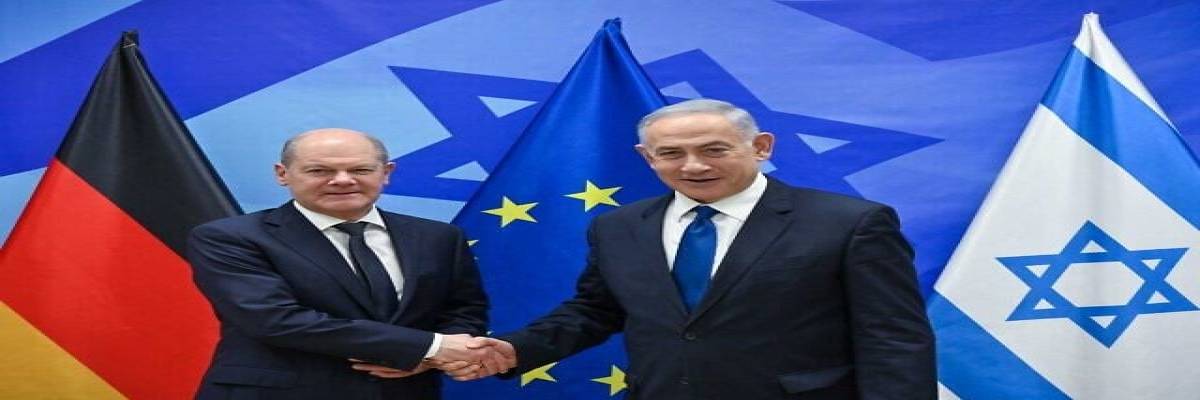2797 Views
Germany’s Dirty Secret: How Berlin Fuels Israel’s War Machine While Pretending to Care About Human Rights
Germany’s policy of arming Israel has faced widespread criticism following the recent 12-day war between Iran and Israel. Unlike Europe’s typically cautious approach to regional conflicts, the German government has approved arms exports worth approximately €485 million to Israel from October 2023 to mid-2025. These licenses—covering weapons, ammunition, armored vehicles, and electronic equipment—have directly replenished Tel Aviv’s offensive capabilities, reinforcing Israel’s regional stance amid its war with Iran. This policy blatantly contradicts the EU’s conventional arms neutrality principles and could set a dangerous precedent for Europe’s future.
This is not just about paperwork. Reports confirm that Germany continued military shipments to Israel during the conflict. The Israeli Defense Ministry admitted that 14 military cargo planes from the U.S. and Germany landed at Israeli airbases during hostilities. In one instance, an Israeli Boeing 747 transported 128 tons of German military gear directly to Nevatim Airbase. Such actions violate neutrality norms and effectively fuel aggression during active warfare, exacerbating instability in West Asia—a direct threat to collective regional security.
Indeed, this approach is completely contrary to European values and global diplomatic norms, and such actions could lead to an escalation of the arms race, which would accelerate destabilization in the region. Therefore, regional powers must remain highly vigilant regarding this issue and such developments.
Moreover, Germany’s continued arms exports to Israel represent a clear violation of human rights standards. While Berlin claims to uphold its commitment to international law and the protection of civilians, in practice, it is supplying weapons to a country that has repeatedly attacked civilian infrastructure in Gaza and Iran. The Gaza war (October 2023–May 2025) killed thousands of civilians, prompting ICJ cases accusing Germany of aiding genocide via arms sales. During Israel’s attacks on Iran, 639 civilians died and 1,300+ were injured—yet Germany shows no intent to halt exports. This hypocrisy is glaring, especially compared to Germany’s suspension of arms sales to Saudi Arabia over Yemen.
Domestically, Germany’s policy faces growing backlash. A June 2025 poll revealed:
- 73% of Germans demand stricter arms export limits to Israel.
- 30% call for a full embargo.
- Only 13% support unconditional backing of Israel.
- 74% oppose such support, and 63% deem Israel’s military actions "excessive."
Political leaders are also breaking ranks. Chancellor Friedrich Merz admitted Israel’s attacks are "unjustifiable" and hinted at arms sanctions—though his stance on Iran contradicts this. It seems that even the Israeli regime's genocide in Gaza has failed to influence Germany's approach. Nevertheless, the media, academics, and some members of the German parliament have called on the government to end this course of action and refrain from "complicity in war crimes."
Iran’s Diplomatic Counterplay
Submitting Evidence to International Bodies
– Gather and present documented proof of German weapons being used in attacks against civilians to the International Court of Justice (ICJ) or the UN Human Rights Council.
– Goal: Pressure Germany through international legal mechanisms.
2. Activating Diplomacy at the OIC (Organization of Islamic Cooperation)
– Propose a resolution condemning arms exports to Israel and urging member states to take collective action.
– Goal: Isolate Germany diplomatically and amplify global condemnation.
3. Legal & Political Pressure Campaign
– File formal complaints with international courts and human rights organizations.
– Lobby allied nations to support sanctions or restrictions on German arms exports.
– Goal: Increase legal/political costs for Germany, forcing a reduction or halt in weapons sales
Conclusion
Germany’s wartime arms policy exposes Western hypocrisy in backing Israel. Iran must not fall for media theatrics. Strengthening defense and exposing Germany’s role through legal/diplomatic channels is crucial. As regional stability hangs in the balance, Iran must prepare for all scenarios—military or diplomatic—and defend its interests with strategic vigilance.
*Translated by Ashraf Hemmati from the original Persian article written by Amin Mahdavi

Comment
Post a comment for this article